I haven’t read much of Gene Wolfe’s work, even though everybody tells me it’s fantastic. There are 25 novels and almost 10 short story collections, so deciding where one should start feels like a chore in itself (maybe we can christen it as the Moorcock Dilemma).
That’s a problem for this year’s Hugo reading, obviously, because one of the candidates in the category of Best Related Work is a book called Between Light and Shadow: An Exploration of the Fiction of Gene Wolfe, 1951 to 1986 by Marc Aramini. It’s a tome that goes through Wolfe’s works one by one, providing analysis, discussion and interpretations — and it’s quite useless for anybody who hasn’t read the original works first.
I run into the author Marc Aramini online and he suggested I read a couple of short stories before checking his analyses: Suzanne Delage (1980) (available online), The Island of Dr. Death and Other Stories (1970) (available online in audio form, but I happened to have it around in translation) and The Changeling (1968) (not available online, but the short story collection Gene Wolfe’s Book of Days which includes it is, in turn, included in the collection Castle of Days, available for Kindle at Amazon). (Here’s a handy list of other online Wolfe shorts, by the way.)
I read these stories and enjoyed The Island and The Changeling enormously (Suzanne Delage not that much). Then I read Aramini’s analyses which were interesting, even though he reads them in a slightly different way than I and focuses much more on deciphering the “real” answers. Being something of a Wolfe n00b, writing a book review about all the questions that I found myself wondering didn’t seem like the best option.
Instead, I interviewed Aramini who was kind enough to anwer all my questions in depth via email. Hopefully this exchange will be interesting to other people as well and provide some context for the book. As far as I know, it will be included in the Hugo voter packet that is going to be sent out soon.
Between Light and Shadow was published by Vox Day’s / Theodore Beale’s Castalia House, includes a preface by John C. Wright and was gamed on the Hugo ballot by the Rabid Puppies slate. I’m sure that’s quite a severe triple handicap for a lot of Hugo voters, and I don’t know yet how I’ll be voting on this category myself.
However, discussing the works of great writers is always fun and enlightening.
So, here it is:
First, tell a little about yourself. What made you a Wolfe fan?
I have held a lot of jobs: a high school and community college teacher of both Biology and English, performing a handstand act in a circus (amidst other responsibilities), working in banking and in gyms, but I think much of my interest in books and in SF/fantasy in particular comes from a childhood that felt ever so slightly lonely. My parents were both in the military, though throughout my life it was my mother and her duty stations that determined where we lived and moved to. I was raised as an only child, and my earliest memories are of living in Europe and having only the most rudimentary grasp of the language spoken around me. Many of my happiest (and most empathetic) moments came from exploring the SF that spoke to me so strongly when I began to read seriously.
 I first encountered Gene Wolfe in about the fourth grade, and almost immediately I felt as if, even though I might not fully understand him, he would understand me completely. His first truly successful story, “The Island of Doctor Death and Other Stories,” is the perfect exploration of a lonely childhood populated with friends, heroes, and not-so-evil villains from books – all figures which help us mature and understand the complex world around us.
I first encountered Gene Wolfe in about the fourth grade, and almost immediately I felt as if, even though I might not fully understand him, he would understand me completely. His first truly successful story, “The Island of Doctor Death and Other Stories,” is the perfect exploration of a lonely childhood populated with friends, heroes, and not-so-evil villains from books – all figures which help us mature and understand the complex world around us.
In graduate school about more than a decade and a half ago, I came across Wolfe’s mailing address, and to my surprise, he answered my letter. Our correspondence over the years solidified my impression that this wonderful writer was also a generous and kind man, worthy of the respect I had for him in every way. I guess all of this is saying that I am merely a fan who loves Gene Wolfe. Somehow, that feeling of love, respect, and awe grew into this monster of a project, which attempts to analyze everything he has ever published.
What’s the story behind your Hugo-nominated book Between Light and Shadow: An Exploration of the Fiction of Gene Wolfe, 1951 to 1986?
The internet age connected readers in a way I could never have imagined as a child, and part of that wonder involved exploring what other people thought about Wolfe and his complex work. In 2012 he was honored with the Fuller Award in a beautiful, unforgettable ceremony in Chicago. I had been posting my ideas about Wolfe’s work probably since about the year 1999 or so online, and it shocked me when I introduced myself to someone at that event – a nearby person, overhearing it, recognized my name, so very far away from home. It was a community the like of which I had never encountered in person before.
As I spoke with some of the other prominent fans there, we came to the conclusion that his early work and many of his brilliant short stories had been completely neglected. My overarching character flaw is pride, so in my hubris I told them when I got home I would start analyzing his early stories in painstaking detail and hopefully engender discussion on the Urth Mailing List, probably the most consistently interesting center for discussion of Gene Wolfe online. I had no idea until I was about forty write-ups in that this would be publishable, and its chaotic beginning necessitated ridiculous amounts of editing.
The total project will contain 246 essays, and I have 12 left to finish. Without a doubt this was the most difficult thing I have ever undertaken in my life, because Wolfe is quite frankly not only brilliant and ridiculously allusive, but also extremely subtle. I wrote this for Wolfe fans knowing it would never be a commercially viable project, and I am happy that someday soon they will have a hardback version — if it fails to answer some of the questions they have, I feel it is successful in giving them a starting point, because each and every story involved more leg work than a casual fan might believe. I can only imagine how much research and thought went into the construction of most of these stories in the pre-internet age — staggering. And even after four years of serious writing and research, I still get the feeling that Wolfe is often a few steps ahead of me.
So, there’s going to be a second volume?
The second volume, Beyond Time and Memory, is “almost” done, but it is trending a bit long at this point. Hopefully I can get it in one volume, as I intended, and completed in the next few months.
What are your own favorites in Wolfe’s oeuvre and what makes them your favorites?
The magical experience of coming upon The Book of the New Sun as a child and experiencing a unique mix of religious sentiment, SF elements, philosophy (both pragmatic and abstract), and interesting characters partaking in mysterious events will forever set it as one of my favorites. As an adult, I appreciate The Book of the Short Sun, the Latro books, and so many of his novellas: “Seven American Nights,” “Forlesen,” “The Island of Doctor Death and Other Stories” and the stories that play with that title.
The sense of depth, wonder, and intelligence behind his construction always seemed to me on the level of the greatest Modernist writers respected in mainstream fiction, but with the bizarre themes that I find innately interesting. Identity, memory, perception, loneliness, apotheosis, mortality, morality, and the clash between ancient but perhaps instinctive belief systems and the ever changing modern world are all explored in his fiction in a way that is paradoxically both dream-like and cogent.
As a dedicated Wolfe fan, are there any works by Wolfe that you don’t particularly like?
I tend to appreciate them all on re-reading. Some are more confounding than others. Once I figured out There Are Doors I loved it, and the same may be said of “The Adopted Father” — once I understood it as a metaphor for the writing of science fiction and fantasy tales and how he views his readers, the affection in my breast for Wolfe as a creator grew. Neither of those stories impressed me the first time through.
I acknowledge that some of his stories are not as fun to read before the sub-text is understood. (The short story “Bloodsport” comes to mind – for a bit I doubted that I could make much of the story, but eventually my research paid off.) Wolfe also has a habit of changing his style to suit each project, so readers looking for a Book of the New Sun every time will definitely be disappointed initially.
Do you have some other favorite authors besides Wolfe?
Yes! Laurence Sterne, Fyodor Dostoyevsky, Yukio Mishima, Proust (though largely because of Wolfe), Vladimir Nabokov, Roger Zelazny, Theodore Sturgeon, R.A. Lafferty, William Faulkner, Jack Vance, and Jorge Luis Borges are a pretty good start there. One of my favorite books to actually read through, however, was The Norton Anthology of English Literature — especially the poetry and drama before the realistic and naturalistic novel came to dominate the literary scene.
Are you connected to academia or are you strictly a non-academic scholar?
I have taught college English before, but currently this is only my hobby. That doesn’t preclude the possibility of getting my doctorate someday — I think in a perfect world I would have been a college teacher for most of my adult life… where else could I listen to myself talk for hours at a time in front of a captive audience? On a more serious note, sharing my passion and appreciation for intricate and beautiful art has always been one of the motivating features of my character. In my arrogance I assume that I can share some of that love with others.
What Wolfe’s works would you suggest for somebody like me who has read very little by Wolfe and wants to give him a try?
The Book of the New Sun, The Fifth Head of Cerberus, Peace for mainstream readers, or The Island of Doctor Death and Other Stories and Other Stories and The Best of Gene Wolfe for his most enduring short stories. (And if they feel lost, hopefully my commentaries can help a little bit!)
[Note: The Wolfe Wiki gives a similar and a bit more elaborate answer in its A Novice’s Guide that may be of help for other people in my situation.]

I just read an article on Wolfe and his work by Hannu Blommila. He said, among other things, that “Wolfe seems to have a steady, almost childlike trust on the reader’s intelligence and persistence.”
Do you think that’s a fair assessment? Is the confidence Wolfe’s texts have on the readers’ abilities to make sense of them part of the charm?
Definitely. I am never bored reading a Wolfe story because it relies on that active participation. In his best work, the story is satisfying even when you haven’t quite grasped the significance of his sub-text. Whether that faith is well-placed or not is still up for debate. It could very well be that he has far too much faith in us. There are only a few authors that require that kind of active participation, and most of those are well known for their challenging aspects (like the later work of James Joyce, as an obvious example — but Wolfe’s fiction is at its best fun to read even without that deep investment).
The couple of your commentaries that I read from Between Light and Shadow put very much emphasis on finding out what is it that really happens in the story. On “The Changeling”, you wrote: “…it might be the first analysis where multiple solutions for the simple question ‘what happened here?’ can be entertained”.
Do you think of Wolfe’s stories as puzzles to be solved?
Yes, because I buy into the validity of intent.
Two people who work in plumbing, construction, electronics, or automobiles can communicate with each other even if they don’t speak the same language because they share objective knowledge in their specialty. The engineering, scientific mind of Wolfe creates patterns of meaning that reflect back on the plot. I think much of his writing involves writing around a very clear outline without revealing the entirety of his plan, only hinting at it. Thus, in a novel about religious syncretism in the ancient world, a bull being killed gains a symbolic resonance (Mithras, Sol, sacrifice) that is present in the text regardless of whether the reader picks up on the allusion – because the author was aware of it when he wrote the story (especially if the author was Wolfe).
Thus, I feel I could have failed badly in my task (and that others have forced solutions on Wolfe which do not actually explain the small details in the text). In that way I see much of his fiction as elaborate, deep, and maddeningly sophisticated word problems. Perhaps there are at times multiple solutions that seem to fit the details that we have, but I honestly believe that the author had a particular solution in mind when drafting the novel, and his cryptic tendencies are shared by a few self-conscious creators. Wolfe is good at creating extremely elaborate and entertaining puzzles.
Is there a “right” answer to questions like “what has really happened between the protagonist and Suzanne Delage in ‘Suzanne Delage'” or “which one is the changeling in ‘The Changeling'”?
I’m asking this because I kind of enjoyed the ambiguous atmosphere and the weight of the unexplained in those stories, and while I was reading them I didn’t necessarily feel that there should be one comprehensive solution to be unearthed.
Yes, but you don’t have to get there to enjoy the story. I honestly believe there is a “right” answer from the author’s point of view, but that there are other authors who do not have this kind of rigid, disciplined mindset and write from a place of the subconscious or unconscious. I really do not feel that this is the case with Wolfe, and I have written about 700,000 words so far between the two volumes which argue that his mysteries have universal solutions. I think one of his tasks is using the tool-box of post-modern subjectivity and uncertainty to imply that there is still a universal structure behind the act of creation.
However, any reader’s response about their own reaction to the text or how it engages with reality is of course valid. Much like a math word problem, I think readers can get the author’s intended solution “wrong” — thus I separate reading into objective interpretation and subjective response — in Wolfe, I insist that the sub-text is often a part of objective interpretation. (This is not a popular mindset in late 20th century thought — but it is also the reason for all of the effort I put into each and every write-up: I could completely and utterly get it wrong and fail in the task I have set for myself.)
For more on this idea, see Wolfe’s story “Trip-Trap” and my commentary on it — in that story, the spiritual world is more objectively real than the subjective narratives each of the participants construct about themselves.
You said you have corresponded with Wolfe. Has he read your analyses or commented on them?
Wolfe is notoriously silent and cagey about his work. Once upon a time he answered some minor questions. Let me only say that one of my most controversial conclusions actually originated with Wolfe, and that his affirmations are equally oblique: on my reading of “The Changeling,” he merely said, “I always loved ‘Lil Abner’.”
He is very good at dodging direct questions, and I try never to press that issue in our correspondence. I think he feels that giving readers a definitive solution is “cheating.”
I’m not very well-read on Wolfeology. Are there differing schools of thought among the more hardcore Wolfe aficionados on how his works should be interpreted? How do you position yourself in that scene?
Oh yes. There are many who are much more open to less authoritative readings and emphasize that the reader creates meaning, advocating that there isn’t really a solution. I think that there is a type of writer who subverts universal meaning (say, William Burroughs, for example) but that Wolfe writes with quite deliberate patterns in mind. Some critics don’t stick closely enough to the text in their theories for my taste (here I will name Borski, since he is a published Wolfe scholar) and others force a preconceived and overwhelming naturalistic agenda on a fairly religious writer (and here I am referring to Peter Wright).
You can find in the Urth Mailing List thousands of pages of discourse on Wolfe’s use of myth, biblical themes, or obscure ur-texts as interpretational keys. I think the text should always come first, with the symbolism of Catholic ritual and tradition to supplement that interpretation coming next, followed by classical and mythical allusions. Hopefully good readings are possible without having to scour ancient Greek manuscripts, simply by reading the novels and stories Wolfe actually wrote.
A quote from Nick Gevers: “As a very subtle but also very emphatic Roman Catholic propagandist, Wolfe is commanding us to perceive our bodies and our physical surroundings for the pale mortal envelopes that they are, and rise into the divine light. Any godless secular world, he declares, is Hell, a place where any solutions are temporary, partial, empty.”
Do you think that’s a good characterization of Wolfe? Is Wolfe’s faith central to his art? Is the cross on your book’s cover art a hint to that direction?
 Yes, the cross and the emphasis on symbols on the cover definitely plays with this idea, but the difference between your typically sincere Catholic or Christian writer is the almost obsessive over-thinking that Wolfe brings to every task.
Yes, the cross and the emphasis on symbols on the cover definitely plays with this idea, but the difference between your typically sincere Catholic or Christian writer is the almost obsessive over-thinking that Wolfe brings to every task.
In the first volume of The Book of the New Sun, Wolfe has the Chatelaine Thecla say, “One can’t found a novel theology on Nothing, and nothing is so secure a foundation as a contradiction. Look at the great successes of the past — they say their deities are the masters of all the universes, and yet that they require grandmothers to defend them, as if they were children frightened by poultry. Or that the authority that punishes no one while there exists a chance for reformation will punish everyone when there is no possibility anyone will become the better for it.”
That is a sharp and biting indictment of religious thought, and it is not directly overturned. (The answer to the second part is ensconced in theodicy, the explanation of evil in a world created by an all-benevolent power — that the world must be free so that our choices for good mean something, and that in a free world, terrible things will happen and go unpunished — if virtue was always rewarded instantly, where then is the power of the moral choice? Instead of meaningful actions, we become trapped in a system without free will to avoid immediate punishment.)
Wolfe’s fiction grapples with these very challenging ideas, and we often see characters abandon their faith and descend into despair. The rational, observant, and human figure of Wolfe makes faith as complex as it can be, not simple propaganda. For all the Christ imagery associated with Severian, one is still left questioning at the end of everything if any good at all came of it, or simply more death and pain. However, I do not think that Wolfe quite takes the almost Gnostic point of view which Gevers does — the secular world, too, is part and parcel of creation, and not innately bad or good. If it becomes Hell, it is often through human agency.
Wolfe seems to be something of a writers’ writer in the sense that many successful authors (Swanwick, Gaiman, Le Guin) are his fans. Why do you think that is? Do you think that Wolfe has influenced the way other authors write in some way?
Part of it, especially in his work in the 1970s and 1980s, stems from the fact that he integrates so many writing tricks while still producing a satisfying surface narrative with so many complexities underneath, something writers tend to notice. The thematic structure, implied detail, mix of subtle and heavy-handed symbolism, and characterization all blend together quite well in his best work.
Unfortunately, while the themes and stories may have influenced some authors, the worldview that Wolfe often espouses does not seem to be as pervasive in younger writers. So much of the power of his fiction comes from the sincere look at the numinous and mysterious while never abandoning rational thought. It seems that now instead of unifying the mind of the engineer and the spiritualist, most writers tend to be far less streamlined, espousing positivism or a chaotic and raw spirituality or religion devoid of rational consideration.
Wolfe’s exploration of the inner spiritual world is never useless or completely abstract because he is able to meaningfully tie those themes into his plot and characters, showing them struggle with doubt and meaning in ways that, at least in my opinion, are not off-putting to even the least spiritually inclined individual. Some readers might even take The Book of the Long Sun as a criticism of the Catholic Church and its rituals.
Do you share the opinion that contemporary SFF is in general not as good or interesting as it used to be? If so, do you think it has to do with the poetics of the field or rather with larger-scale aesthetic/ideological/etc. shifts in society?
I actually enjoy the grittier turn in recent fantasy literature, and appreciate more surrealistic techniques in fiction. At the risk of sounding older than I am, I do think that turning away from a classical education born of tradition may have hampered the depth and richness of much serious writing, because I ascribe to the now almost controversial belief that good fiction says something universal about the human condition, regardless of who and where we are, and that it is worthwhile to engage with that tradition or we risk forgetting something important about humanity as a whole, where we have been and why we made the choices that we did.
Thus, I applaud the turn to literary, symbolic, and complex themes in SF, but am a bit saddened by the loss of our ability to appreciate narratives that seem out of date or don’t jive with our current agendas. The American and English SF and Fantasy of the 1970s almost seems as if it came from a completely different culture in hindsight. For example, the criticism of Wolfe that I most frequently see involves his treatment of women and their hyper-sexualization, but I have also read that writers like Henry Miller were considered “feminists.” Miller’s tone towards women is extremely object oriented and vulgar, and almost entirely sexualized. I can’t imagine a woman like Maytera Mint from Book of the Long Sun in his work.
I haven’t found the unique eccentric voices in modern SF that writers like Lafferty, Cabell, E.R. Eddison, Mervyn Peake, and Dunsany naturally had, but I think the New Wave was a definite step in the right direction. I don’t necessarily think that that movement’s bold experimental emphasis on style and form has been continued in the field today, but I don’t read as widely as I should in it.
Are you connected to the organized SFF fandom? Do you go to conventions, vote for the Hugos or something?
Even though I have read widely in the field in the past, as an adult I tend to gravitate towards more traditional (though still often “experimental” fiction) and I consider myself first and foremost a Gene Wolfe fan. Thus, I attended the Fuller Award Ceremony in 2012 and the Nebula Awards in 2013 because of Wolfe.
Between Light and Shadow was published by Vox Day’s small press Castalia House and ended up on the Hugo ballot due to his Rabid Puppies nominating campaign. You have repeatedly said that you don’t wish to take part in political debates surrounding the Hugo awards and that your own book is as non-political as possible.
Have you been surprised by the SFF fans’ reactions to you and the book (that most of them haven’t seen yet)?
Honestly, I was a bit surprised at the vehemence of their reaction. My primary motivation was in getting a readily available hardback reference book for Wolfe’s fans, knowing that it would take immense effort and would never be commercially lucrative. I was hoping that many of the reviewers and writers I sent it to would read it and possibly mention it. Almost none did so. There was only silence.
The lack of acknowledgement was hard to reconcile with the years of obsessive effort I had put into the project. One scholar had a podcast in which he talked for about twenty minutes about what a monograph on Gene Wolfe covering his works would have to entail, and then didn’t even answer after I sent him a copy of what I had done with it. The Encyclopedia of Science Fiction has not been updated to include my work, though it lists even minor pamphlets on Wolfe and every other book length publication in that section, and has been updated several times since I sent one of its editors a copy.
I will not speculate as to the reasons for that deafening silence, because I do believe in the quality of my work regardless of the response it receives (at the very least, I know the years of labor that have gone into what will ultimately be two volumes). There is a scene in one of my favorite movies, Fist of Legend, in which the main bad guy berates his underling, who believes he has beaten a prominent Chinese martial artist fair and square, according to the principles of Bushido. The leader stands, beats his chest, and asks (paraphrasing), “What do you know about the way of the samurai? It is to do what must be done, regardless of the costs. For your name to be disgraced and to be cursed as a villain throughout all eternity if necessary.”
While that is way too melodramatic for the choices I made in getting my book published, I feel that I had a definite goal, which I achieved: a quality edition of holistic Wolfe scholarship, with the help of a dedicated editor, Matthew King, to make the volume as good as it could possibly be. I still feel that my work deserved better than to be ignored by the many venues I attempted to send it to and I hope that it will be considered on its own worth some day, but I know the love and effort that went into it, and I know Gene Wolfe knows that too, so I have resolved to be content with that even if few actually consider my work worthy of their time and attention.
Thanks, Marc!
Thank you!
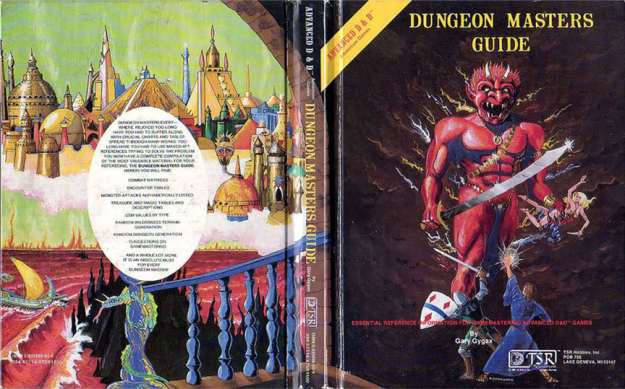

 I first encountered Gene Wolfe in about the fourth grade, and almost immediately I felt as if, even though I might not fully understand him, he would understand me completely. His first truly successful story, “The Island of Doctor Death and Other Stories,” is the perfect exploration of a lonely childhood populated with friends, heroes, and not-so-evil villains from books – all figures which help us mature and understand the complex world around us.
I first encountered Gene Wolfe in about the fourth grade, and almost immediately I felt as if, even though I might not fully understand him, he would understand me completely. His first truly successful story, “The Island of Doctor Death and Other Stories,” is the perfect exploration of a lonely childhood populated with friends, heroes, and not-so-evil villains from books – all figures which help us mature and understand the complex world around us.
 Yes, the cross and the emphasis on symbols on the cover definitely plays with this idea, but the difference between your typically sincere Catholic or Christian writer is the almost obsessive over-thinking that Wolfe brings to every task.
Yes, the cross and the emphasis on symbols on the cover definitely plays with this idea, but the difference between your typically sincere Catholic or Christian writer is the almost obsessive over-thinking that Wolfe brings to every task.


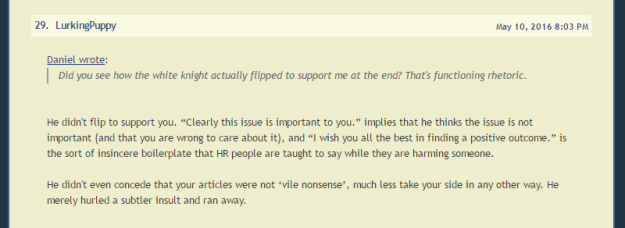
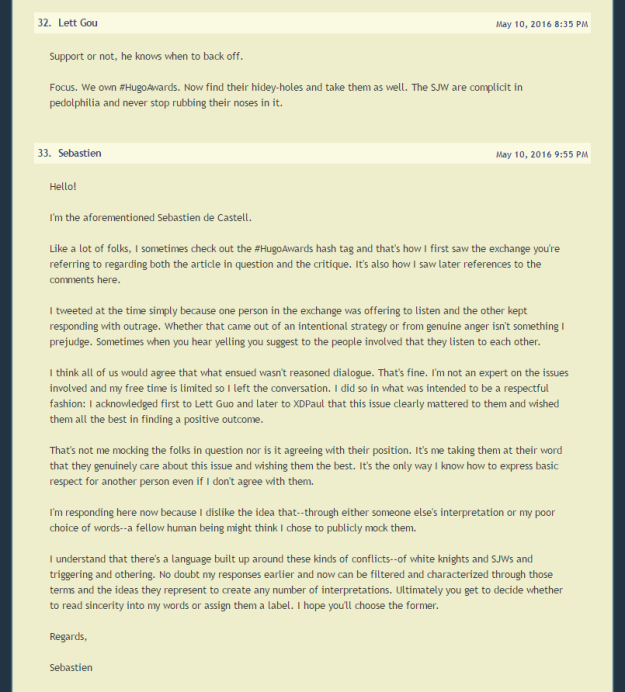
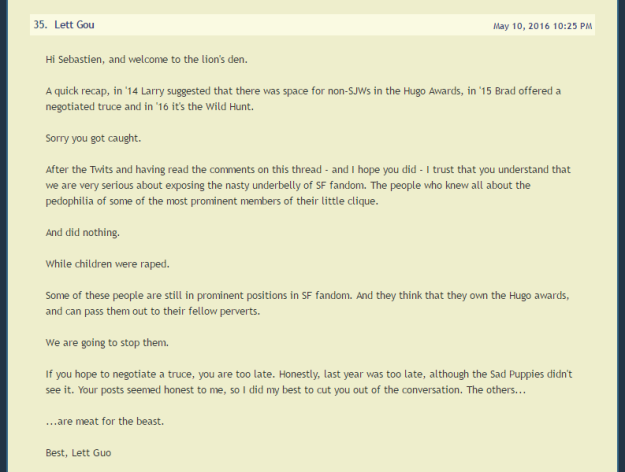
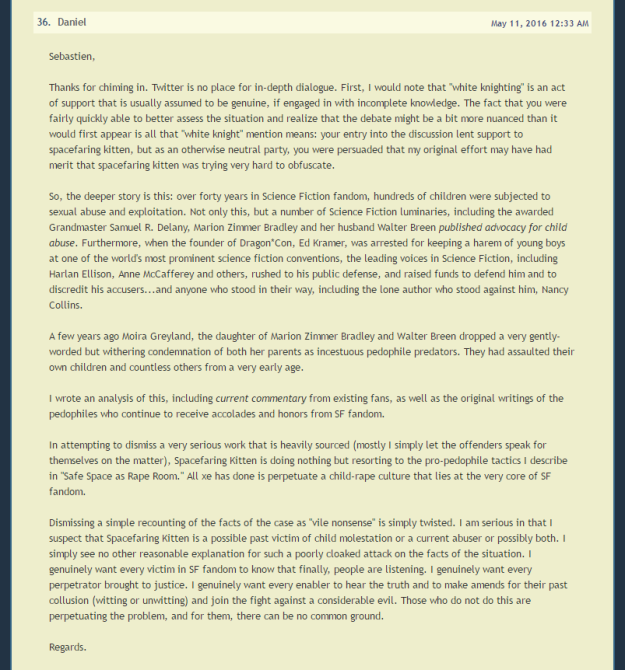
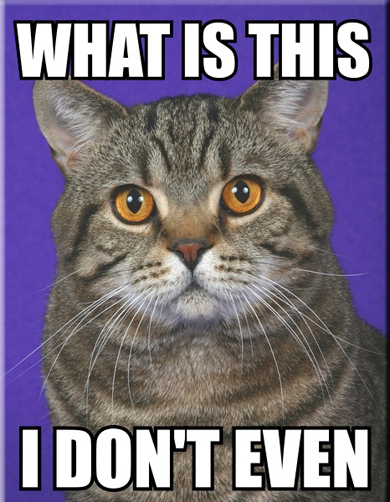



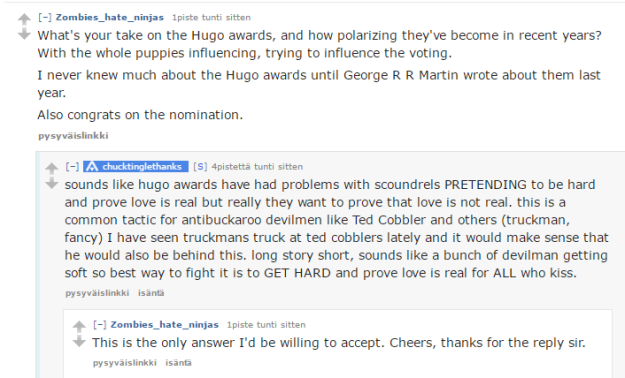
 In the best scenario, the Dragon Award may become The SFF Award That Ends The SFF Award Wars. Rabid Puppy and Sad Puppy activists — that is, people who opined last year that they want to end the politicization of the Hugo Awards by cramming the shortlist with politicized works (that didn’t turn out so well) — have been busy in declaring victory. If they decide to quit pestering the Worldcon fans and start gnawing on dragons’ slippers instead, everybody will be little bit happier. In case the slipper-owners won’t object, of course.
In the best scenario, the Dragon Award may become The SFF Award That Ends The SFF Award Wars. Rabid Puppy and Sad Puppy activists — that is, people who opined last year that they want to end the politicization of the Hugo Awards by cramming the shortlist with politicized works (that didn’t turn out so well) — have been busy in declaring victory. If they decide to quit pestering the Worldcon fans and start gnawing on dragons’ slippers instead, everybody will be little bit happier. In case the slipper-owners won’t object, of course.